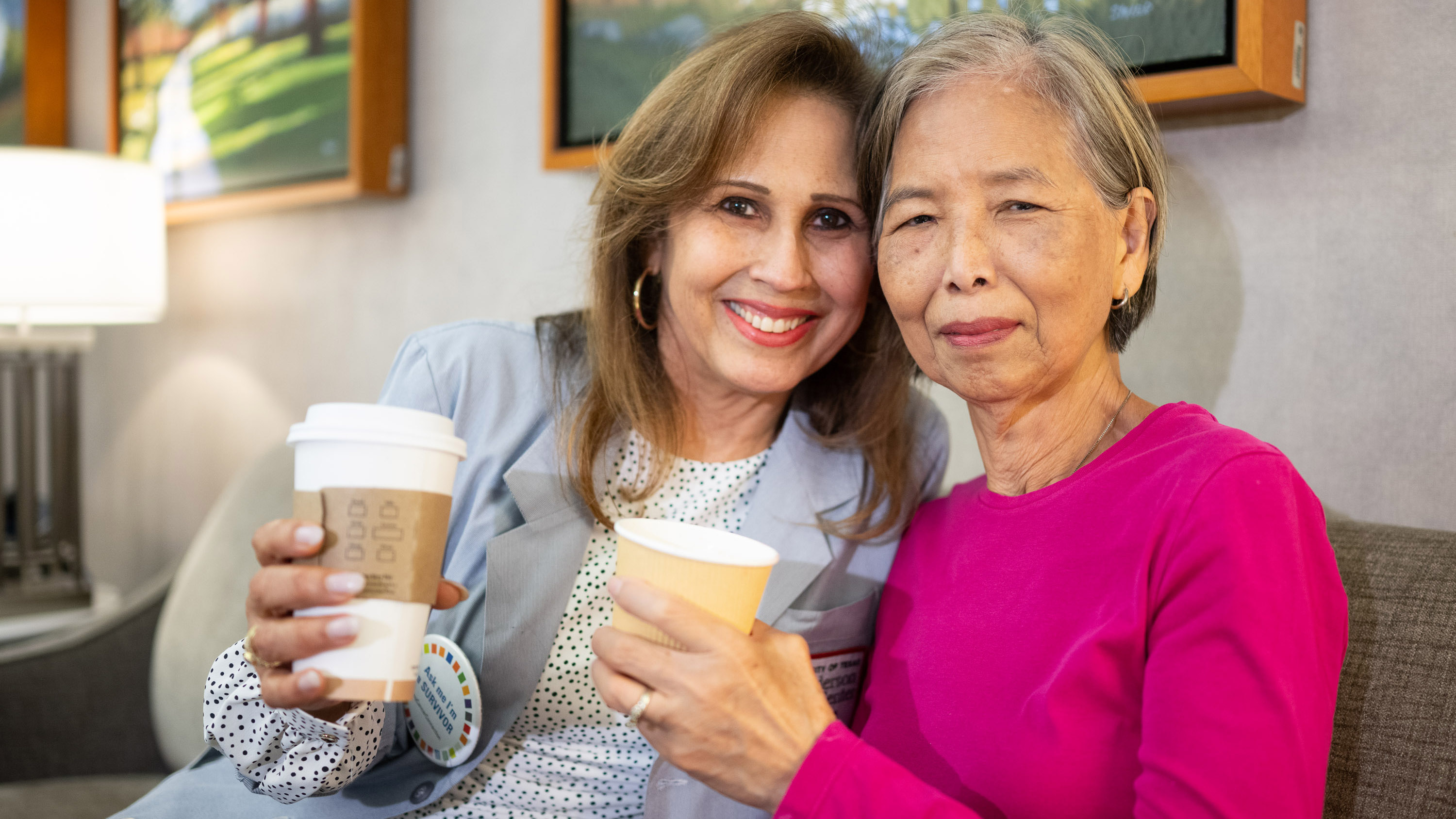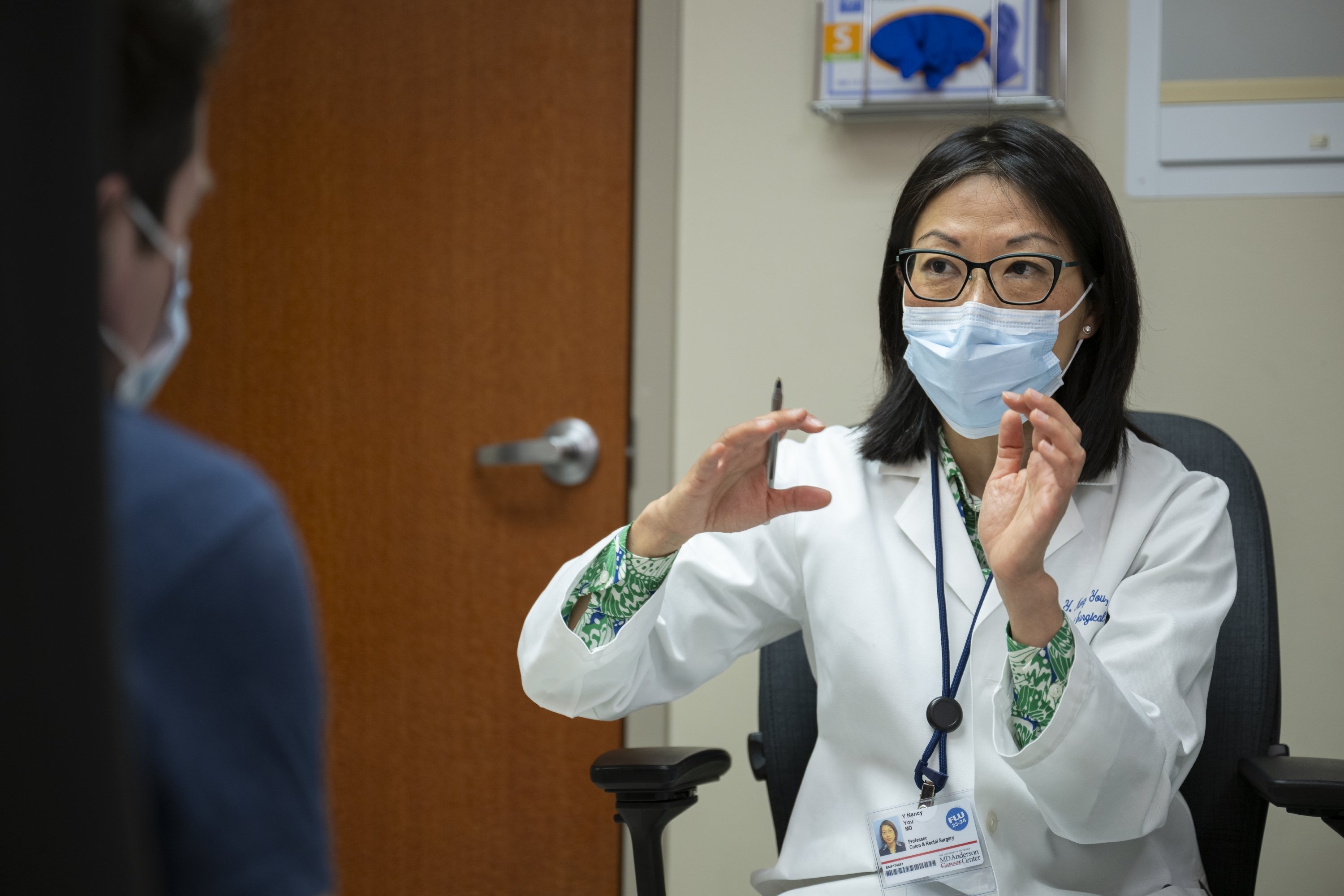- Diseases
- Acoustic Neuroma (14)
- Adrenal Gland Tumor (24)
- Anal Cancer (68)
- Anemia (2)
- Appendix Cancer (16)
- Bile Duct Cancer (26)
- Bladder Cancer (72)
- Brain Metastases (28)
- Brain Tumor (232)
- Breast Cancer (714)
- Breast Implant-Associated Anaplastic Large Cell Lymphoma (2)
- Cancer of Unknown Primary (4)
- Carcinoid Tumor (8)
- Cervical Cancer (158)
- Colon Cancer (166)
- Colorectal Cancer (118)
- Endocrine Tumor (4)
- Esophageal Cancer (44)
- Eye Cancer (36)
- Fallopian Tube Cancer (8)
- Germ Cell Tumor (4)
- Gestational Trophoblastic Disease (2)
- Head and Neck Cancer (12)
- Kidney Cancer (128)
- Leukemia (342)
- Liver Cancer (50)
- Lung Cancer (286)
- Lymphoma (278)
- Mesothelioma (14)
- Metastasis (30)
- Multiple Myeloma (100)
- Myelodysplastic Syndrome (60)
- Myeloproliferative Neoplasm (6)
- Neuroendocrine Tumors (16)
- Oral Cancer (100)
- Ovarian Cancer (172)
- Pancreatic Cancer (160)
- Parathyroid Disease (2)
- Penile Cancer (14)
- Pituitary Tumor (6)
- Prostate Cancer (146)
- Rectal Cancer (58)
- Renal Medullary Carcinoma (6)
- Salivary Gland Cancer (14)
- Sarcoma (238)
- Skin Cancer (296)
- Skull Base Tumors (56)
- Spinal Tumor (12)
- Stomach Cancer (64)
- Testicular Cancer (28)
- Throat Cancer (92)
- Thymoma (6)
- Thyroid Cancer (98)
- Tonsil Cancer (30)
- Uterine Cancer (80)
- Vaginal Cancer (16)
- Vulvar Cancer (20)
- Cancer Topic
- Adolescent and Young Adult Cancer Issues (20)
- Advance Care Planning (10)
- Biostatistics (2)
- Blood Donation (18)
- Bone Health (8)
- COVID-19 (362)
- Cancer Recurrence (120)
- Childhood Cancer Issues (120)
- Clinical Trials (632)
- Complementary Integrative Medicine (22)
- Cytogenetics (2)
- DNA Methylation (4)
- Diagnosis (232)
- Epigenetics (6)
- Fertility (62)
- Follow-up Guidelines (2)
- Health Disparities (14)
- Hereditary Cancer Syndromes (126)
- Immunology (18)
- Li-Fraumeni Syndrome (8)
- Mental Health (116)
- Molecular Diagnostics (8)
- Pain Management (62)
- Palliative Care (8)
- Pathology (10)
- Physical Therapy (18)
- Pregnancy (18)
- Prevention (918)
- Research (392)
- Second Opinion (74)
- Sexuality (16)
- Side Effects (604)
- Sleep Disorders (10)
- Stem Cell Transplantation Cellular Therapy (216)
- Support (402)
- Survivorship (322)
- Symptoms (182)
- Treatment (1786)
After AML, survivor continues to be a channel of blessings
3 minute read | Published October 22, 2013
Medically Reviewed | Last reviewed by an MD Anderson Cancer Center medical professional on October 22, 2013
Eight years after undergoing treatment for a Hodgkin's disease recurrence, Kenneth Woo was just about to graduate from his oncologist's care at MD Anderson.
Then, the unthinkable happened: he was diagnosed with acute myeloid leukemia (AML) after suffering from fatigue and dizziness that he'd thought was anemia.
"I'll never forget the sad look on my doctor's face when he told me I probably had leukemia," Kenneth says. "At that point, going from Hodgkin's disease to leukemia felt like getting a death sentence."
Doctors told Kenneth that AML was a common side effect of the type of radiation and chemotherapy he'd received as part of his Hodgkin's disease treatment.
"Because two of my chromosomes were mutated from previous cancer treatments, it didn't look promising," Kenneth recalls.
At that point, Kenneth and his wife Clara -- who were raising two young daughters -- agreed to ensure neither faced this AML diagnosis alone. They agreed to tell each other exactly what they were feeling, even on their worst days.
AML treatment: A clinical trial and chemotherapy
For his AML treatment, Kenneth immediately began chemotherapy and enrolled in a clinical trial that kept him in isolation for weeks. He couldn't see his daughters at all. And, when his blood cell count dropped to zero, Kenneth could only see Clara through a glass window.
Doctors told Clara that although the AML wouldn't kill Kenneth, the chemotherapy might since he needed such a highly toxic level of treatment.
Both Kenneth and Clara wondered what the future would hold for their family. Would Kenneth live to see his daughters graduate from high school? What would happen to the girls and Clara if he didn't survive?
"We pledged to each other that regardless of whether I lived, we would be a channel of blessings for others for the rest of our lives," Kenneth recalls, saying that even in those dark moments, they wanted to use their experience to help others.
Undergoing a stem cell transplant to cure AML
After successfully completing chemotherapy, Kenneth underwent a stem cell transplant, which doctors said offered the best hope for a long-term cure for his AML. His sister, Emily, donated her stem cells.
To make his body more receptive to the new stem cells, Kenneth underwent another clinical trial, where he received the drugs fludarabine and intravenous busulfan.
When the procedure was complete, Kenneth came out on the other side of AML. He's been cancer-free for the last decade.
He still takes anti-rejection drugs to keep his immune system from fighting the transplanted stem cells. But he says this is a small price to stay cancer-free and get to experience so many more milestones, such as seeing his daughters go to college.
Giving back to other cancer patients
The Woos have kept their promise to be a channel of blessings, helping other cancer patients and their families as often as possible.
Both Kenneth and Clara help out in the Be a Match Registry Drive whenever they can and volunteer at MD Anderson. Even their oldest daughter spent a summer volunteering here during high school. Kenneth volunteers with myCancerConnection, a patient-to-patient support network that allows him to provide a listening ear and support for other patients.
"When I volunteer at MD Anderson, I feel like I can light up the life of another person for just a second. That's meant a lot to me, my wife and our girls," he says. "Volunteering makes me feel like I'm not a victim of cancer. I'm a survivor."
AML is one of the cancers MD Anderson is focusing on as part of our Moon Shots Program to dramatically reduce cancer deaths. Learn more about our AML/MDS Moon Shot.
Related Cancerwise Stories

Volunteering makes me feel like I'm not a victim of cancer. I'm a survivor.
Kenneth Woo
Survivor





